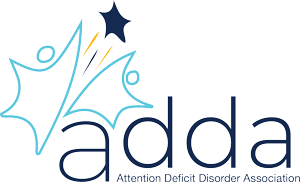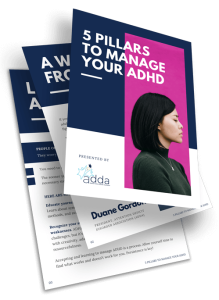ADDA’s Commitment to Science-Based Support
ADDA is committed to providing adults with ADHD support that is trustworthy and grounded in rigorous science. We rely on peer-reviewed research—scientific studies evaluated by independent experts—as the foundation for our recommendations. Our resources are evidence-based, meaning they reflect interventions and approaches shown through research to be effective. We stay guided by science-based best practices, applying the latest insights from researchers, clinicians, and the broader medical and mental health communities to meet the real-world needs of adults with ADHD.
Why Evidence Matters
Adults with ADHD face an overwhelming landscape of conflicting messages. Quick fixes, unproven treatments, and misinformation are everywhere. This confusion wastes time, delays meaningful progress, and undermines well-being. You deserve better. You deserve resources grounded in scientific integrity—tools that empower you to thrive.
How ADDA Delivers
ADDA earns your trust by:
✔ Grounding all programs, resources, and content in current peer-reviewed research and expert consensus
✔ Partnering with experienced, credentialed ADHD professionals from diverse disciplines
✔ Regularly updating our materials to reflect emerging research and evolving best practices
✔ We pledge to only promote treatments, products, or approaches that are supported by credible, scientific evidence
Science Meets Real Life
While research is the foundation of everything we do, your lived experiences shape how we apply that knowledge. Your stories, challenges, and successes bring essential meaning to the data. They help us design programs and resources that reflect real-world needs and foster authentic connections.
Moving Forward Together
ADDA is—and always will be—a safe, evidence-based space to learn, grow, and connect. We remain unwavering in our commitment to providing what works, what’s safe, and what’s true. You deserve nothing less.
Together, we can build understanding, foster community, and empower adults with ADHD to live fully and authentically.
ADDA’s Position on Equity and Inclusion
At the Attention Deficit Disorder Association (ADDA), we strive to serve all adults with ADHD. We work to make our organization and our opportunities accessible to all adults with ADHD. ADHD does not discriminate. Neither does ADDA.
Given our responsibility to serve all members, we recognize that we can’t serve effectively until we see clearly, especially when serving underserved and otherized communities. Therefore, we are committed to always seeing our members and the uniqueness of their stories. Living up to this commitment ensures our service will positively impact our members.
Furthermore, we aim to have our leaders represent all our members. This is a big goal. It will demand our best selves, and then it will require us to be and do more. We gladly accept this challenge.
The Use of Medication/Specific Drug
The Attention Deficit Disorder Association (ADDA) believes that the goal of treatment for ADHD is to help the individual lead a fulfilling and happy life, building upon his/her strengths and talents and compensating for impairments imposed by ADHD.
While medication is currently the intervention with the greatest amount of research supporting effectiveness in adults with ADHD, ADDA does not specifically advocate the use of a medication in general, or any specific medication in particular, as a treatment for ADHD. Proper diagnosis and recommendations from a qualified medical professional are key in developing an effective, comprehensive treatment plan, which may include education, medication and lifestyle changes.
Over, Under and Misdiagnosis of ADHD
Attention Deficit Hyperactive Disorder (ADHD) is found in adults around the world. Over 12 million — or 1 in 20 — adults in the United States have ADHD, yet 85 percent have not been formally diagnosed or treated. Limited access to resources in underserved communities, overlapping symptoms with other disorders, stigma, age, and gender variances in symptom presentation all contribute to delayed diagnoses. Additionally, many adults are mistakenly diagnosed with another condition or their difficulties are dismissed, so their ADHD is never diagnosed or treated.
Conversely, high demand for a limited supply of expert clinicians pushes evaluations to general care. Clinicians lacking expertise in ADHD, pressed for time, and without adequate tools, may give the diagnosis to patients who do not have ADHD.
ADDA advocates an appropriate, comprehensive evaluation. A thorough clinician will obtain standardized ratings from multiple informants and will also consider objective evidence. This may include a computerized test of attention and related symptoms of ADHD, and may also include a developmental survey; medical, educational, and behavioral history; evidence of normal vision and hearing; and recognition of any systemic illness.
There are risks in the diagnostic process including, but not limited to:
- The predominant and incorrect view that Attention Deficit Hyperactivity Disorder is “а common mental health condition that affects children, particularly boys.” This often leaves adults, especially women, struggling without a diagnosis or treatment.
- Other mental health conditions or comorbidities are common among people with ADHD. These comorbidities can mimic or compound ADHD symptoms and may result in a missed ADHD diagnosis or missed diagnosis of the comorbidity.
- Race, culture, ethnicity, gender, other social identities, and our implicit biases related to them, are important considerations in understanding — and properly diagnosing and treating — ADHD.
No one part of the evaluation paints a complete picture. The reality is that ADHD diagnosis is hard. New assessment technology can generate objective cognitive data that will serve as a valuable supplement to observational assessments. Improving efficiency with computerized tests can also improve the understanding of the data and enable easier assessment of treatment response.
That is why the Attention Deficit Disorder Association (ADDA) encourages individuals to seek evaluation and treatment of ADHD from a qualified professional in the disciplines of medicine, psychology, social work, professional counseling, or psychiatric nursing who not only has the appropriate license or certification, but also has training and experience in the differential diagnosis and treatment of ADHD in adults. Ideally, the professional would also have training or experience in cultural sensitivity.
Comorbid Conditions
The Attention Deficit Disorder Association (ADDA) supports adults with ADHD. We address the unique challenges and strengths of adult ADHD.
Understanding Comorbid Conditions
Research shows as many as 65% of adults with ADHD have comorbid conditions. These include dyslexia, anxiety, depression, autism spectrum disorders, and others. These coexisting conditions complicate the lives of those affected. They also demand specialized support and interventions.
Scope of Expertise
ADDA develops programs, educational materials, and support networks that address ADHD. Ensuring their high quality demands that we apply the latest ADHD research, best practices, and real-life experiences.
Why We Focus Our Support
- Specialized Knowledge: We know adult ADHD. We stay current with advancements in ADHD research. We use that knowledge to develop resources aligned with the needs of adults with ADHD.
- Resource Allocation: By concentrating on ADHD, our resources have the greatest impact. Our members receive the best possible support and guidance. Expanding our scope to include many coexisting conditions would dilute our effectiveness.
- Quality: Our focus helps us transform lives within the ADHD community. We can deliver specialized, impactful programs, ADHD-friendly education, peer support, and skills training.
Commitment to Our Mission
ADDA is steadfast in its mission to empower adults with ADHD. By focusing on ADHD, we provide our members the most effective and meaningful support. We will always work to enhance our services within our area of expertise. We encourage members with comorbid conditions to seek the appropriate professional support. Our concern is always the best mental health of our members.
ADDA Partnership and Funding Acceptance Policy
The following serves as the ATTENTION DEFICIT DISORDER policy governing acceptance of partnerships, sponsorships and projects generating funds or other benefits for the organization. This policy is intended to guide the board on deciding which of these offers in order to avoid real or perceived conflict of interest of both the organization and individuals associated with ADDA and any potential partners.
- General Principles
- ADDA has worked hard over the years to establish itself as a reputable source of information. Preserving that reputation is of the utmost importance.
- ADDA will only accept project participation, sponsorships and/or partnerships that are in line with and support ADDA’s mission.
- Any potential partners must be providing a project, service or product that is beneficial to the adult ADHD community, in line with the ADDA mission and values and is in keeping with generally accepted standards of care, preferably have some empirical validation.
- Any potential partners must reflect positively upon ADDA and not diminish ADDA’s reputation.
- Conflicts of interest
- Where real or perceived potential conflict of interests exists due to personal, financial and/or professional involvement of ADDA board or committee members through any project, sponsorship and/or partnership opportunity, these conflicts of interests will be handled in accordance with ADDA’s Conflict of Interest Policy.
- To ensure that ADDA maintains its reputation within the ADDA community, even the perception (internal or external) that any board or committee members has misused their influence to obtain advertising or partnership opportunities must be avoided. This may mean foregoing an opportunity that is otherwise of benefit but could be perceived as being unfairly beneficial to individuals officially and unofficially connected to ADDA.
- If a board or committee member has an opportunity to share with ADDA, that person may speak on behalf of the opportunity, but must recuse him or herself during any vote related to the opportunity.
- Reimbursement
- The fee for partnerships will be negotiated on a case by case basis depending upon factors such as ADDA’s involvement and expenditures; potential income for the partner; the partner’s profit or nonprofit status and size, etc.
ADDA will have set fees for advertisements in its newsletter and on its website. The board may vote to waive that fee for worthy entities or when the advertising has been included in any partnership arrangement.
Media Inquiries: The Attention Deficit Disorder Association (ADDA) welcomes media inquiries about our organization and adult ADHD. For more information about how members of the media can contact ADDA, visit: www.add.org/adda-news-room/


